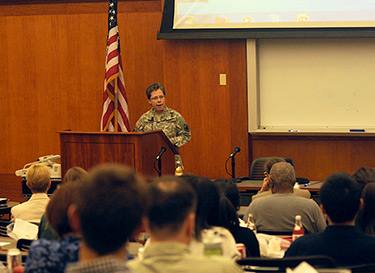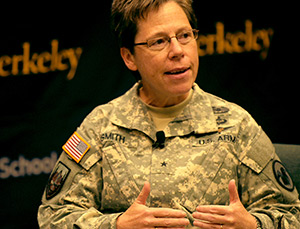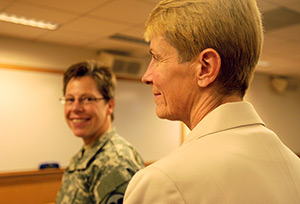By Andrew Cohen

audience at Berkeley Law.
For Tammy Smith, the first openly gay general to serve in the United States military, professional success had always been linked with personal secrecy. After meeting her wife Tracy Hepner in 2004, however, the weight of living two lives increasingly proved too much to bear.
“It became harder and harder to keep those worlds separate,” Smith said during a riveting presentation Sept. 22 at Berkeley Law. “The most important part of my life I had to keep secret.”
During her talk, Smith reflected on her experiences before, during, and after the military’s “Don’t Ask, Don’t Tell” policy. Enacted in 1993, the policy ruled that applicants should not be asked about their orientation and that the military could not punish service members for their sexuality—so long as it stayed secret.
“At the time, I thought, ‘this is good, this is progress,’” Smith recalled. “I was already good at not telling anyone … it was almost a celebration of my own self-marginalization because I was so used to living that lie.”
While dating Hepner, the couple had an established grocery shopping routine. If Smith saw a military colleague, Hepner would wander off to a different part of the store or—worst-case scenario—pretend to be a mere acquaintance.
“While huge progress was being made in terms of LGBT equality, what was happening in the world wasn’t happening in my world,” Smith said. “During this time I saw service members chain themselves to the White House fence, outing themselves and calling call attention to this issue. I didn’t do that. I felt I was a soldier, not an activist.”

at the Haas School of Business.
Before long, though, Smith felt she could no longer be a soldier. Despite her career success and love of the Army, she submitted her retirement papers in 2009. In February 2010, however, she heard Joint Chiefs of Staff Chairman Admiral Mike Mullen lambaste Don’t Ask, Don’t Tell. He called the policy “incongruous with the military’s mission and values” and said it “forces young men and women to lie about who they are in order to defend their fellow citizens.”
Smith cried upon hearing those words. “For the first time, a uniformed leader said ‘you’re okay the way you are,’” she explained. Smith got her retirement rescinded, and Congress repealed Don’t Ask, Don’t Tell in September 2011—ending the ban on gays serving openly in the military.
Six months later, Smith and Hepner married. Five months after that, Smith was promoted to Brigadier General of the U.S. Army Reserve. “We decided to be out during that promotion ceremony because we wanted to represent ourselves exactly as we are,” she said. “I think of the ceremony not as a statement of my sexual orientation, but as a statement of my family.”
Her road to history
Smith enrolled in the University of Oregon’s ROTC program in 1982—the same year a defense directive from President Ronald Reagan upheld longstanding U.S. policy that “homosexuality is incompatible with military service.” The program allowed Smith to pay for college.

“I didn’t play to stay in the Army, but once I got there, I loved it,” she said. “Every time I put that uniform on, I felt I represented our nation’s values and something larger than myself.”
Ironically, some of the core skills that Smith gained in the Army—inner strength, resilience, the ability to compartmentalize—helped her juggle a double life. She navigated between “completely separate” communities, with clear rules among her gay friends to “pretend we don’t know each other,” if they ran into her military colleagues.
Smith’s talk exemplified the progress that has been made since then. The event was co-sponsored by what for ages would have been an implausible pairing of student groups: the Boalt Association of Military Veterans (BAMV) and the Queer Caucus. It was funded by Ropes & Gray.
Before Smith addressed the crowd, gay rights activist Michael Bedwell gave an illuminating presentation about the history of gays in the military. The damning account of their treatment included descriptions of “queer stockades” where military members found to be homosexual were kept in a confined area and openly mocked and jeered.
Other speakers at the event included Coast Guard Lieutenant Nick Monacelli ’16, who spoke on behalf of BAMV; and Adrian Kinsella ’15, who described the Boalt Veteran Assistance Project (BVAP)—which provides free legal assistance to veterans on myriad issues. Others addressing the crowd included Navy veteran Heather St. Clair ’15, the vice president of BAMV and BVAP; Queer Caucus member Talia Nissimyan ’15; and BVAP supervising attorney Elizabeth Kristen of the Legal Aid Society Employment Law Center.
Smith—who has served in Afghanistan, Costa Rica, and Panama—remains hopeful that the U.S. military will continue to reflect society’s growing acceptance of homosexuals and gay marriage.
“So far, I haven’t encountered any barriers as a result of my decision to come out,” she said. “It truly has been a positive experience.”